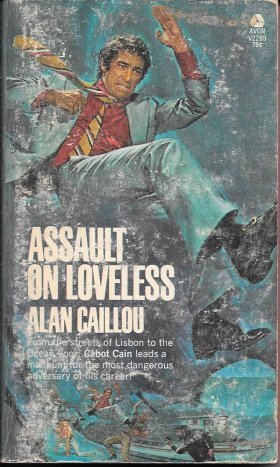He said: “But why, Cain? For God’s sakes, why?”
I said: “And there’s a very simple reason there, too.”
He thought for a while, turning the possibilities over in his mind. He said at last: “If Loveless was behind that theft the driver spoke of...what in hell is he doing in Portugal? Is he...for God’s sake, is he planning to wipe us all out here? A residue of his Angola enmity?”
“I doubt it. I think he’s got a better plan, one that makes a lot more sense.”
“But that’s something he could do, if he were so inclined...”
“Yes indeed. And all he did was make a casual attempt to wipe out a small military contingent that was due to land on the beach by the Bocca. Just a small-scale business all round.”
He didn’t know about the Army exercises, and when I told him he sank back into the pillows and said wearily: “I still think it’s a lot of nonsense, but I’m not fit enough to argue with you. For God’s sake, take Astrid to dinner and leave me to enjoy my suffering in peace, will you do that for me? And, for your information, if they’re really playing around with botulinum on Gruinard, nobody’s going to steal any of it. Nobody.”
I said: “And you might as well get out of bed, your fever’s breaking. I’d like you to do a little job for me tomorrow.”
Suspiciously, he squinted up at me out of the pillows. “Tomorrow? What sort of job, Cain?”
I said: “I want to know if a sour cream factory has changed hands recently. Quicker for you to find that out than for me, wouldn’t you say?”
“A sour cream...Oh, for God’s sake!”
“No. For the sake of the Devil.”
I took Astrid’s arm and we went out together. On the stairs, I told her: “There’s a nice old man waiting to meet you. Were going to see General Queluz, a friend of your uncle’s. They say he’s got the best cook in Lisbon.”
◆◆◆
But we had no dinner that night. The drama became suddenly personalized.
We drove over in the Jensen to the fine old house above the Alfama, and parked in Praca Santa Lucia by the railings that are high above the narrow streets of the lower quarter, looking out across the rooftops at the river for a moment, listening to the noisy night sounds, coming up from below there; a lottery-ticket seller was shouting his wares, calling out in a melodic, high-pitched voice that broke off sharply and left the last syllables hanging. We could hear the mournful notes of a fado, the sad-sweet love song of the Portuguese; somewhere down there a woman was mourning a lost love.
We went over to the house and knocked on the door, and the white-gloved servant was there, with an expression of abject contrition on his sly face. He said, and he sounded very worried: “The General is not yet back, Senhor. All I can do is ask you to wait. And I know he would expect me to offer his apologies.”
“Oh? Back from where?”
“He went out, Senhor, to one of the lagosterias beyond Cascais, to find Sergeant Nacimento. A lagosteria near the Bocca do Inferno.”
“Bocca do Inferno? What would Nacimento be doing there at this time of night?”
He shrugged his narrow shoulders. There was a trace of worry on his face. “I do not know, Senhor, I only know that someone called and said Nacimento was there, with something to show the General, urgently.”
“Someone?”
“I do not know who he was.”
“And you’re worried?”
He could not easily hide the concern that was there. He said slowly: “Perhaps it is nothing, Senhor, but there is a parade of the Honor Guard tonight at Castele São Jorge, and Nacimento would not miss this. I do not think he would go out to the Bocca when he is expected to take his place in the parade.”
“And does the General know about the parade too?”
“Perhaps. Perhaps not.”
It didn’t sound right at all. I said harshly: “What time was this?”
“At half past five, Senhor.”
“Get me the castle on the phone, can you do that?”
“Sim Senhor, de uma vez...”
He hurried away, and we followed him into the high-ceilinged, paneled library. I poured a glass of cognac for Astrid and one for myself, and told her: “This just might be all the dinner you’re going to get tonight.”
In a moment, the call came through, and I took the phone and said urgently to the operator at the castle: “I don’t want to interrupt the parade, Senhora, but do you know Sergente Nacimento?”
The connection was bad, the line crackling. She said: “Yes, Excellency, I do.”
“Then tell me if he’s on parade, can you do that?”
She did not hesitate. “Of course, Excellency, he’s leading the Honor Guard.”
“And what time did the parade start?”
“At four-thirty, Excellency.”
“And the sergeant has been there all the time?”
“Sim, Excelencia, certamente.”

























